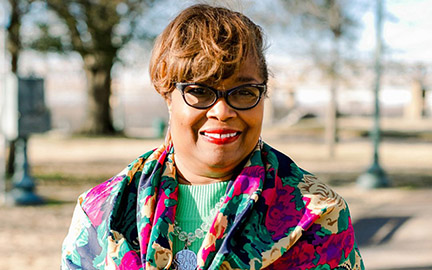By Toby Sells
“The relentless pursuit of prosperity for all.” It’s a heroic statement for a heroic endeavor.
But that is exactly how Beverly Robertson, president and CEO of the Greater Memphis Chamber, defines the work of her group. When she first helmed the Chamber three years ago, she asked the agency’s 35 employees for their definitions of the group’s work and jokes that she got 35 different answers. After those interviews, she polished that definition into something simple and easy to remember, noting that brief statement is “the anchor for everything we do.”
Memphis native Robertson and her husband, Howard, created TrusT Marketing, but she took a hiatus from her company in 1997 to lead the National Civil Rights Museum, a position she held until 2014. There, she led a $43 million fundraising effort to pay for massive renovations at the museum, making it an internationally known destination.
Chamber members tapped Robertson to lead the organization in October 2018. The move came after the shooting death of then-Chamber CEO Phil Trenary in September of that year. She took the reins in January 2019.
“In addition to her extensive experience at the helm of an internationally recognized nonprofit organization, Beverly’s leadership experience in both corporate America and small business make her a perfect fit for the organization,” Richard W. Smith, regional president of the Americas at FedEx Express and then-Chamber chairman, said at the time. “She understands the needs of our membership and our community and we believe she is the right person at the right time to continue the work that we’ve started. Our city has tremendous momentum and I expect under Beverly’s watch, the Chamber will continue to be a strong voice of positive change in our community.”
While only one of her years leading the Chamber has been free of the pandemic, Covid has not slowed Robertson’s work toward that aim of “prosperity for all.” That work has included, of course, helping to land Ford Motor Co.’s $5.6 billion truck manufacturing facility in West Tennessee. But for Robertson, it’s not just about the big fish. It’s prosperity for all, not some. And inclusivity was one of her first jobs for the Chamber.
“Our city has tremendous momentum and I expect under Beverly’s watch, the Chamber will continue to be a strong voice of positive change in our community.” – Richard W. Smith
“The Chamber typically operated as a two-legged stool, and those legs involved business and government,” Robertson says. “But if we are to drive sustainable change in Memphis, Tennessee, we need to have a three-legged stool and that other leg is the community. There are few things that will be sustainable long-term without engaging the voices of the community.”
Maybe the most visible example of this engagement is the Chamber’s “From Protest to Progress” plan, launched in February 2021. The first seed of the plan was planted at a community meeting in summer 2020, ten days after Memphis’ first protest of the public killing of George Floyd by police in Minneapolis. Government, clergy, activists, and business leaders convened for what was described then as a “powerful listening session” that had “never been done before.”
The plan is ongoing and pledges to “align activists’ concerns with business goals to create a more economically inclusive Memphis.” The effort isn’t window dressing. Companies are looking for cities with diverse marketplaces and with a diverse workforce, Robertson says. “We have got to understand that some of the assets that we’ve never sold before, we’ve got to put them front and center now because those are the attractors of these new business opportunities.”
Those opportunities lie in a marketplace with “fierce competition out there,” she says, and Memphis has to get more competitive. But, as the old business adage goes, “if you can’t measure it, you can’t improve it.” That’s where a new Chamber program steps in. Launched in September 2021, the Center for Economic Competitiveness measures the city’s economic performance against peer cities (like Nashville, New Orleans, and St. Louis) on 40 indicators.
“This is Memphis vs. Errrybody,” says Ted Townsend, the Chamber’s chief economic development officer. “At the end of the day, we want to be able to say ‘scoreboard’ to our competitors. To do that, we have to keep score.”
As CEOs go, Robertson is in a truly unique position. She leads her group, of course, and does what’s right for the Chamber’s members. Those members, though, are all leaders, too, all of them brimming with passion and ideas.
“It is extremely challenging because — for as many members as we have — I feel like all of those are my bosses,” Robertson says. “I have to listen respectfully. I have to allow their voices to be heard. I have to look at the data. Then, I have to make a decision that I believe is in the best interest of business.”


